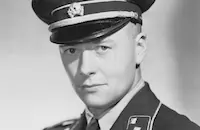The Rookie Cop

Brief Synopsis
Cast & Crew
David Howard
Tim Holt
Virginia Weidler
Janet Shaw
Frank M. Thomas
Robert Emmett Keane
Film Details
Technical Specs

Synopsis
Clem Maitland, a rookie cop, travels his beat accompanied by his police dog, Ace, until the police commissioner, ridiculed by the press because of the department's inability to curb the current crime wave, bans the canine. The commissioner's animosity toward the dog intensifies when Clem's friend, Tom Hadley, is accused by an eyewitness of robbing a fur warehouse, and the dog disputes the identification. Consequently, when the crime ring decoys Clem while he is guarding a payroll truck, and makes a clean getaway with the money, the commissioner suspends Clem from the force. Undaunted, Clem and Ace investigate the scene of the crime and discover a glove that one of the thieves has left behind. Realizing that this evidence presents the one chance to clear his friend, Clem and Ace trace the glove's owner to the roadhouse that serves as the gang's headquarters. That night, Clem, accompanied by his fiancée, Gerry Lane, the police chief's daughter, goes to the roadhouse to investigate. Recognizing Clem and his dog, the crooks take them prisoner along with Gerry. However, Ace makes a daring escape and frees Clem, who calls the police for reinforcements. As the police converge upon the roadhouse, Ace fingers the ring leader. The canine's heroics put an end to the commissioner's prejudices, as he officially authorizes the use of dogs in police work.

Director
David Howard
Cast

Tim Holt

Virginia Weidler
Janet Shaw
Frank M. Thomas
Robert Emmett Keane
Monte Montague
Don Brodie

Ralf Harolde
Muriel Evans
Ace, The Wonder Dog
Crew
Guy K. Austin
Edward Donahue
Perry Ferguson
Bert Gilroy
Morton Grant
John C. Grubb
Earl Johnson
Frederic Knudtson
Lee Marcus
Jo Pagano
Van Nest Polglase
Renie
Roy Webb
Harry Wild

Film Details
Technical Specs

Articles
The Rookie Cop
Filmed for the lush sum of $77,000, the screenplay concerned novice policeman Clem Maitland (Tim Holt), who finds himself in a quandary when his handyman friend Tom Hadley (Monte Montague) is fingered in a lineup as one of the hoods responsible for a warehouse fur heist. Clem insists that his pet and informal K-9 partner Ace (Ace) could demonstrate that Hadley's scent was nowhere to be found at the crime scene; the commissioner (Robert Emmett Keane), who doesn't buy into the viability of police dogs, places Hadley into lockup. It gets worse for Clem when the real warehouse thieves decoy him from his assignment guarding a payroll shipment, murdering a watchman in the process. The young cop finds himself suspended for dereliction of duty. Clem remains determined to break the racket, and with the assistance of his girlfriend Gerry (Janet Shaw), the watergun-wielding neighbor kid Nicey (Virginia Weidler), and, of course, Ace, you know the heavies don't stand a chance.
At the time The Rookie Cop was made, the 21-year-old Holt, son of the silent-era star Jack Holt, was establishing the niche that he would occupy with RKO into the early '50s as their go-to lead for the studio's B western output. While quickie oaters would comprise the bulk of his screen legacy, Holt acquitted himself well on those occasions when he was matched with a director of stature and a script of substance. His work for King Vidor in Stella Dallas (1937), Orson Welles in The Magnificent Ambersons (1942), John Ford in My Darling Clementine (1946), and, especially, John Huston in The Treasure of the Sierra Madre (1948) stand as testament. Holt made only three more screen appearances after his last RKO roundup in 1952, and he was managing a radio station in Oklahoma at the time of his passing in 1973.
As Nicey, the thirteen-year-old Virginia Weidler was full of the trademark precocity that marked her busy tenure as a popular Hollywood child star. Her career was most lastingly marked by her roles as Norma Shearer's daughter in The Women (1939) and Katharine Hepburn's know-it-all kid sister in The Philadelphia Story (1940). Like many of her peers, her prospects faded as she reached young adulthood; she made her last screen appearance in 1943, and completely turned away from show business within a few years afterwards. Unfortunately, a childhood bout with rheumatic fever had affected her health adversely, and she was only 42 when she suffered a fatal heart attack in 1968.
Ace would ply his trade onscreen from 1938 through 1946, moving down Tinseltown's rungs as he worked for Columbia, Republic, Monogram and PRC. The most notable highlights in the pooch's portfolio would include Republic's chapterplay adaptation of The Phantom (1943), portraying the canine sidekick Devil opposite Tom Tyler as the masked jungle hero of the comics. Ace was also prominent in the TV horror-show staple The Monster Maker (1944), featuring J. Carrol Naish as a mad scientist afflicting his victims with acromegaly.
Producer: Bert Gilroy
Director: David Howard
Screenplay: Guy K. Austin (story), Earl Johnson (story), Morton Grant, Jo Pagano
Cinematography: Harry J. Wild
Film Editing: Frederic Knudtson
Art Direction: Van Nest Polglase
Music: Roy Webb
Cast: Tim Holt (Clem Maitland), Virginia Weidler (Nicey), Janet Shaw (Gerry Lane), Frank M. Thomas (Police Chief Gordon H. Lane), Robert Emmett Keane (Commissioner Hugh Thomas), Monte Montague (Tom Hadley).
BW-61m.
by Jay S. Steinberg

The Rookie Cop
Quotes
Trivia
Notes
The working title of this film was G-Dog.














